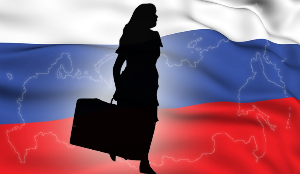Are there signs of fascism in modern Russia?
This is an automatic translation.
Click here to read the publication in the original language.
Sharp political disputes, which are increasingly common on the Internet, end with a comparison of modern Russian reality with what happened in Nazi Germany in the 30s of the last century. At the same time, accusations are often heard from the opposite side that the present comparison is incorrect, with a reference to Godwin's Law, which states: "As the discussion on Usenet (note — on the Internet) grows, the likelihood of a comparison that mentions Nazism or Hitler tends to unit. " ... Is this fair? Let's try to figure it out. So, Wikipedia says that "Godwin's Law" should not be used to determine the winners or losers of a dispute. So, for example, one of the comics by Randall Munroe depicts officers of the anti-Hitler coalition who are trying to discuss the actions of the Italian troops, but come across Godwin's law 😁 Mike Godwin himself ( see Wikipedia ) believes that the principle was formulated not to determine the winners and losers in a dispute, but to reduce the intensity of discussions , reminding participants of the boundaries of acceptable comparisons. Accordingly, this "law" cannot define the comparisons used in discussions as incorrect if there was no logical assessment of the degree of correspondence of the compared object with Nazism, Hitler, fascism, etc. Thus, the violation of "Godwin's Law" also requires proof.
Now, let's go back to the beginning and try to figure it out — are there signs of fascism in modern Russia? Are the comparisons of the current regime in the Russian Federation correct with what happened in Germany in the 30-40s of the last century? We will try to be as objective as possible. To do this, we need to understand — what is fascism? There are many definitions using different criteria. For example, the British journalist Lawrence Britt, having studied the experience of seven fascist regimes, in a well-known magazine in the spring of 2003 also decided to formulate the general features of fascism ( "What about fascism?" ). In Lawrence's article, 14 signs were formulated:
# 1 — Vivid manifestations of nationalism. The solemn demonstration of flags, pride in military achievements, calls for national unity against this background are characteristically linked to suspicions of everything foreign and outbreaks of xenophobia.
In my opinion, there are a lot of signs of the growth of nationalism in Russia. Here are the statements of the deputies about "the dangers of learning foreign languages" and the refusal to use foreign terms, and the constant demonstration of the success of the military-industrial complex, army and navy day after day.
# 2 — Contempt for Human Rights. Under the fascist regime, human rights were devalued — they hindered the fulfillment of the goals of the ruling elite. Using propaganda, such regimes ensured that the population submissively accepted human rights violations, socially isolating and demonizing those who were the target of these violations.
Yes, of course, and this feature also clearly manifested itself in the Russian Federation. And here there is no need to "go far", it is enough to give numerous examples of refusal to agree on rallies and actions guaranteed by the Constitution of the Russian Federation — the right of assembly. Why, there, you can recall the recent statement of the Prime Minister of the Russian Federation Dmitry Medvedev — "Recognizing and protecting human rights, the Constitution of Russia sets the limits of claims to their protection, not recognizing as rights those that come into conflict with traditional values for Russian society ."
# 3 — Find the scapegoats. One of the most significant common features of all fascist regimes was the search for enemies — to hold them accountable for their mistakes, distract the population from other problems and channel social frustration into a controlled channel. People who opposed such regimes were labeled "terrorists" and were treated accordingly.
And here is the "exact hit". Unfortunately, yes, the numerous accusations of extremism among dissenting citizens in the Russian Federation even for harmless reposts or criticism of the authorities (extremism, by the way, is equated to terrorism — terrorists and extremists included in the single list fall under the same restrictive measures in the Russian Federation) — clear proof of this. And even about the search for enemies, you can talk and tell — external enemies (almost the whole world, with the exception of a fairly limited list of countries), internal enemies ( even organizations whose goal is to combat the spread of HIV , and not just political institutions and funds receiving funding from abroad).
# 4 — Dominated by everything military. The ruling elite have always identified themselves with the army. A huge part of the national resources went to military spending, even if it was difficult to meet the country's internal needs. For the fascist regimes, military power was an expression of national superiority, and they used it whenever possible to intimidate their neighbors and increase their power and the prestige of the ruling class.
Well, spending on pension, medical and social security in the Russian Federation has been falling in recent years, while military spending has been growing. The data is open. Therefore, this feature also finds confirmation.
# 5 — Widespread sexism. Fascist regimes saw women as second-class citizens, maintained a firm stance against abortion, and fostered homophobic sentiments in society. This was reflected in the draconian laws, which were supported by the country's traditional religion.
Homophobic sentiments in the Russian Federation are really strong as never before, and, probably, are at their historical climax. The executions of gays in Chechnya, investigated by Novaya Gazeta, are indeed confirmed . The support for these sentiments on the part of the ROC is also strong and open — the numerous statements of the clergy of the ROC on this score (as well as the growth of the fight against abortion) are a clear confirmation of this.
# 6 — Controlling the Media. Under fascism, the media were often under the strict control of the authorities and could not retreat a single step from the party line. The methods of control included not only the issuance of permits and access to resources, economic pressure and insistent calls for patriotism, but also threats.
Undoubtedly. Censorship in the Russian Federation has not been hidden for a long time. All, without exception, the central media are under the complete control of the state. And 2018 became the year of the cancellation of numerous concerts, exhibitions, unjustified fines against independent media and other manifestations of the strictest censorship. Sign "on the face".
# 7 — Obsession with National Security. The national security apparatus served as a repressive instrument for the fascist regimes, operating in secrecy and without restrictions. At the same time, any doubt about his activities was branded as a betrayal.
Unfortunately, even here — aptly, succinctly, on purpose — indeed, more and more often the activities of opposition movements are characterized by the state as a "threat to national security." You don’t want it like in Paris? (c) V.V. Putin ( video ).
# 8 — The connection between religion and the ruling class. The propaganda fueled the illusion that fascist leaders were defenders of the faith and their opposition was atheists. People had the feeling that opposing an elite in power was like rebelling against religion.
And here — yes ((In the past, members of the CPSU, an organization that denied the existence of God in the past, suddenly turned into church-going, deeply religious people. The Church, in the person of the ROC, constantly and actively participates in the socio-political life of the country, clergy make political statements in support of the actions of the ruling regime, and attempts to resist this often try to "pull" the new norms of the Criminal Code (insulting the feelings of believers).
# 9 — Protecting the Power of Corporations While the privacy of ordinary citizens was strictly controlled, large companies could operate with relative freedom. Corporations not only guaranteed powerful military production, but also acted as an additional means of social control.
I don’t presume to explicitly determine the presence of this feature, but, according to my feelings, there is a correspondence here as well — after all, almost 100% of large corporations have a state shareholding, often a "controlling one" — state corporations, of course, enjoy maximum preferences.
# 10 — Suppressing Workers' Associations. Labor movements were seen as a force that could challenge the political hegemony of the ruling class and the entrepreneurs who supported it. Such movements were suppressed and equated with criminal groups. The poor were looked upon with contempt and suspicion.
Unambiguous YES. Let us recall the strike of truckers against the Platon system (controlled by Putin's friends, the Rottenberg, a structure). The strike participants are accused of "trying to liquidate the Russian statehood"! There are many other examples of the oppression of workers and trade union movements in recent years.
# 11 — Contempt for intellectuals and the arts. Intellectual and academic freedom was believed to threaten national security and patriotic ideals. Freedom of thought and expression was condemned and suppressed.
Yes. Yes. Again, yes. Numerous prohibited exhibitions and installations, performances and tours. Refusals to issue rental certificates. All this, unfortunately, also finds its confirmation ((
# 12 — Obsession with crime and punishment. The number of prisoners under fascist regimes was very high, while the police gained a heroic reputation and almost unlimited power, which led to numerous abuses. To justify the expansion of police powers, the authorities stimulated the public's fear of criminals, traitors and enemies.
Russia is a country with one of the highest number of security officials per capita. Already not only the FSB, the police and the National Guard are opposing the fight against dissent, but also the Cossacks with whips — in fact, armed groups, openly endowed with the powers of law enforcement agencies. The police get additional rights. The restrictions on the use of weapons in the crowd and against women have been lifted. Numerous cases of torture by the FSIN and at the ROVD are also clear signs of abuse in the security forces.
# 13 — Protectionism and Corruption Entrepreneurs close to the government used their position to enrich themselves. Corruption developed in both directions: the fascist regime received financial assistance from the economic elite, and the latter received political services from the government. Members of the ruling elite often used their position to appropriate national resources.
In terms of corruption, Russia is on the list of the most corrupt countries . 135th Place in the world out of 180 (the rating starts with the countries with the lowest corruption perception index and ends with the countries, the perception of corruption literally “rolls over”). As for protectionism, its obvious confirmation is compensation from the RF budget to "oligarchs" who have suffered from international sanctions.
# 14 — rigging election results. The supposedly free elections were, as a rule, fictitious. In real elections, the ruling elites tended to manipulate candidates in order to obtain beneficial results.
And election fraud (numerous "carousels", stuffing, refusals to initiate criminal cases on election violations, non-admission of observers) and non-admission of candidates, and an increase in "electoral thresholds", and a decrease in funding in regions where significant support was provided to candidates "not from parties in power ", and much more — a huge number of examples can be cited. Unfortunately, this sign of fascism in Russia also finds confirmation.
What do you think? Is it really that bad? Is the country really sinking into the abyss of chaos and wars?
This is an automatic translation.
Click here to read the publication in the original language.






































